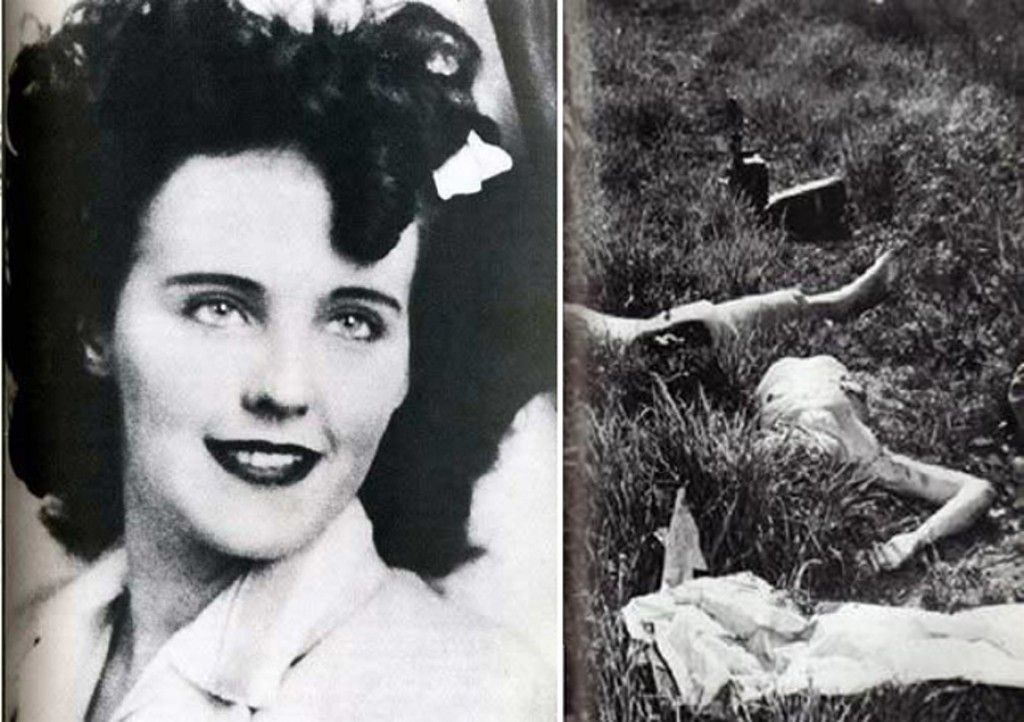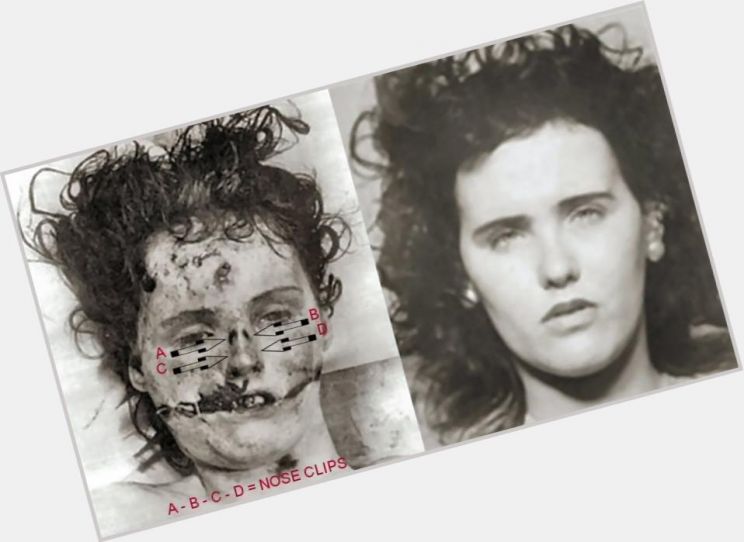Black Dahlia: Unsolved Mystery Of Elizabeth Short's Murder
by Gail Gusikowski IV May 04 2025
Can a single crime, unsolved for over seven decades, truly capture the imagination and anxieties of a nation? The brutal murder of Elizabeth Short, the woman known as the Black Dahlia, remains one of Hollywood's most haunting enigmas, a case that continues to fascinate and frustrate in equal measure.
The story of Elizabeth Short is a tragic one, a descent into darkness that began with a young woman's dreams of stardom and ended in a gruesome tableau that shocked the world. Born in Hyde Park, Boston, Massachusetts, on July 29, 1924, Elizabeth, known as "Beth" to her family, harbored aspirations of becoming an actress. She moved to California, seeking opportunities in the burgeoning film industry of the late 1940s, a land of sunshine and dreams. But her Hollywood journey was abruptly cut short on a cold January morning in 1947, when her brutally mutilated body was discovered in Leimert Park, Los Angeles. The details of the crime were horrific, the victim cut in half and severely mutilated. The press, seizing on the macabre details, christened her the "Black Dahlia," a moniker that would forever link her to the city of angels and its darkest secrets.
The discovery of Elizabeth Short's body on January 15, 1947, sent shockwaves through Los Angeles. A mother taking her toddler for a walk stumbled upon the scene a naked woman, her body bisected, and her face bearing the marks of unspeakable violence. The crime scene itself was meticulously arranged, suggesting a calculated act. The Los Angeles Police Department launched a massive investigation, but the case quickly became a labyrinth of dead ends, false leads, and unanswered questions. Despite numerous suspects, countless theories, and extensive media coverage, the Black Dahlia murder remains unsolved, a testament to the enduring power of the unknown and the limitations of human justice.
- Where To Watch Movies Online Your Ultimate Guide Streaming Options
- Maura Murray Unsolved Disappearance The Search Continues
The case's notoriety stems not only from the brutal nature of the crime but also from the victim's story. Elizabeth Short, a young woman with aspirations of Hollywood success, was found dead in Los Angeles. Her story is a poignant reminder of the fragility of life and the often-illusory nature of dreams. Her childhood, marked by financial hardship and the absence of her father, Cleo Short, who abandoned the family in 1930, shaped her early years. Her relocation to California, seeking fame and fortune, ultimately led her to a tragic fate. The relationships she formed, the men she met, and the choices she made all became fodder for speculation and investigation, but none provided a definitive answer to the question of who killed Elizabeth Short and why.
The investigation involved the FBI, who helped to identify the victim and searched for suspects, even finding fingerprints on a letter that could have been sent by the killer. The police gathered evidence, interviewed witnesses, and explored numerous theories, including the involvement of multiple suspects. One of the most prominent theories pointed to Dr. George Hodel, a physician, whose son, Steve Hodel, later dedicated years to investigating the case and implicated his father in his book "The Black Dahlia Avenger." This added another layer of complexity to an already intricate investigation.
The case quickly captivated the public's attention, turning into a media sensation. Newspapers and radio broadcasts obsessed over the details of the crime. The publics fascination helped turn the case into a macabre cultural phenomenon, sparking endless speculation and inspiring numerous books, movies, and television shows.
- John Nick Stapleton Parkinsons Scams More Latest News
- Before Death The Last Words Of Fashion Icon Crisda Rodriguez
The Black Dahlia murder is a quintessential example of a cold case, one that continues to evade resolution despite decades of investigation. Even now, with advancements in forensic science and renewed interest in the case, the identity of the killer remains a mystery. It continues to be one of the most haunting cold cases in Hollywood. The brutal nature of the murder, the victim's story, and the lack of a definitive solution have solidified its place in the annals of crime history, making it a case that refuses to be forgotten.
As we delve deeper into the Black Dahlia case, its important to remember the human cost of this crime. The tragedy of Elizabeth Shorts life and death continues to resonate, reminding us of the vulnerability of individuals and the enduring quest for justice. The lack of closure for her family and the lingering questions surrounding her murder serve as a testament to the enduring impact of unsolved crimes.
| Bio Data | Details |
|---|---|
| Full Name | Elizabeth Ann Short |
| Nickname | The Black Dahlia |
| Date of Birth | July 29, 1924 |
| Place of Birth | Hyde Park, Boston, Massachusetts, USA |
| Date of Death | January 15, 1947 (aged 22) |
| Place of Death | Leimert Park, Los Angeles, California, USA |
| Cause of Death | Exsanguination due to lacerations to the face and other injuries; body mutilated. |
| Known For | Victim of the unsolved "Black Dahlia" murder, one of Hollywood's most infamous cold cases. |
| Education | Medford High School |
| Family |
|
| Career Aspirations | Aspiring actress |
| Reference | Wikipedia |
One of the most intriguing aspects of the Black Dahlia case is the sheer number of theories surrounding the crime. These theories range from the plausible to the outlandish, reflecting the enduring mystery and the lack of concrete evidence. Some theories suggest the involvement of a jealous lover, a disgruntled acquaintance, or even a serial killer operating in the Los Angeles area. Others point to potential connections to organized crime or shadowy figures within the Hollywood elite. These different theories reflect the complexity and the frustrating lack of closure that has plagued the case for decades. The most prominent theory involves Dr. George Hodel, a physician, as a potential suspect. His son, Steve Hodel, dedicated years to investigating the case and, based on his research, implicated his father in the crime.
The gruesome details of the crime, as reported by the media and documented in police files, are difficult to confront. The victim's body was found bisected and mutilated. The mutilation and arrangement of the body at the crime scene pointed to a calculated, disturbing act, which amplified the case's sensational nature. The brutality of the murder was shocking and has contributed to the enduring horror associated with the Black Dahlia case. The photographs taken at the scene, while often kept private, were released to media, creating an image of horror that became etched in the public's mind.
Over the years, the Black Dahlia murder has inspired numerous fictional works, including books and movies, that sought to reconstruct the events of that fateful day and offer explanations for the unsolved case. The case has also been the subject of documentaries and investigative journalism, exploring the various theories and the individuals involved. This cultural impact speaks to the public's fascination with true crime, the allure of mystery, and the enduring power of unsolved cases. The ongoing interest reflects the societal obsession with exploring the dark side of human nature and seeking justice for the victim.
The use of the nickname "Black Dahlia" itself is telling. It originated from the press and has become inseparable from Elizabeth Short's identity. The name is evocative and glamorous, reflecting the aspirations of the victim and the dark undercurrents of Hollywood in the 1940s. This label, however, also serves as a constant reminder of the anonymity and vulnerability of the victim.
The case also raises questions about the media's role in shaping public perception. The intense media coverage, while bringing attention to the crime, also generated speculation, misinformation, and sensationalism. This highlights the responsibility of the media in reporting on sensitive cases, and how the presentation of facts can affect the investigation and the public's understanding of the events. The press coverage also underscored the societal fascination with true crime and its potential impact on the pursuit of justice.
The absence of a definitive solution to the Black Dahlia murder serves as a chilling reminder of the limitations of the justice system and the lingering possibility that some crimes may never be solved. Despite the efforts of investigators, the accumulation of evidence, and the passage of time, the killer remains at large. This lack of closure leaves a sense of frustration and a sense of injustice that continues to resonate with those interested in the case.
The enduring legacy of the Black Dahlia case is complex. It involves the victim's story, the horrific nature of the crime, the enduring mystery, and the impact on the public imagination. The Black Dahlia case serves as a stark reminder of the dark side of human nature, the fragility of life, and the enduring quest for justice. It also reflects the societal fascination with true crime, the allure of the unknown, and the importance of seeking closure for victims and their families. The investigation and the subsequent theories show how a single crime can generate so many possibilities and leave a permanent mark on a city's history. The case remains a cautionary tale about ambition, exploitation, and the enduring pursuit of truth in a world where shadows often obscure the light.



Detail Author:
- Name : Gail Gusikowski IV
- Username : adrian33
- Email : andy52@hickle.com
- Birthdate : 1971-02-19
- Address : 9815 Schneider Lane Suite 242 Greenfelderberg, OK 72989
- Phone : (719) 339-4616
- Company : Hilpert and Sons
- Job : Commercial Diver
- Bio : Voluptas fugit eum facilis. Corporis dignissimos magni enim adipisci harum non rerum vero. Ipsam consequuntur qui dolores unde culpa ipsa cum. Velit aut dolorem quidem adipisci.
Socials
tiktok:
- url : https://tiktok.com/@armstrong1972
- username : armstrong1972
- bio : Sequi ea aut maiores omnis eveniet quis.
- followers : 6359
- following : 2648
twitter:
- url : https://twitter.com/jacinto.armstrong
- username : jacinto.armstrong
- bio : Eos et voluptatibus modi modi. Odit nemo praesentium qui laborum repellendus. Facilis quia aperiam soluta eius.
- followers : 3836
- following : 1567
instagram:
- url : https://instagram.com/jacinto_real
- username : jacinto_real
- bio : Et in nam labore. Ut et at earum sint minima et. Expedita officiis adipisci qui suscipit esse.
- followers : 4271
- following : 1764
facebook:
- url : https://facebook.com/jacinto_armstrong
- username : jacinto_armstrong
- bio : Dolorem soluta nemo ut expedita consectetur.
- followers : 4578
- following : 2662